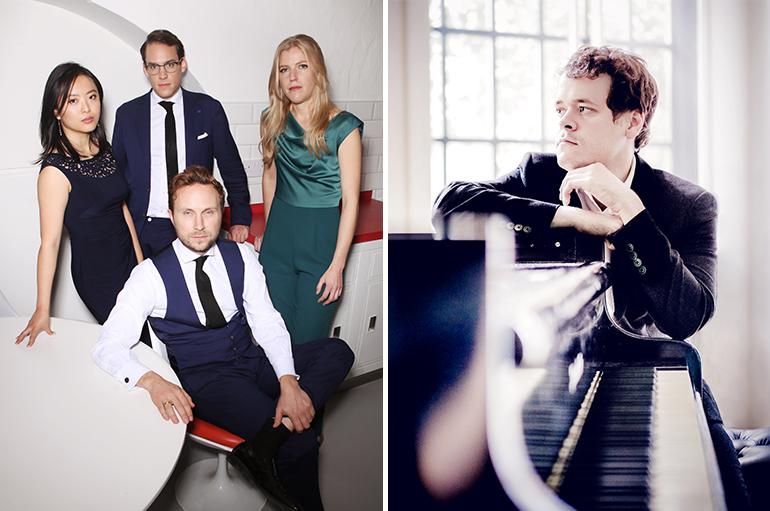Doric Quartet, Grosvenor make an eloquent case for a neglected English composer

The Doric String Quartet and pianist Benjamin Grosvenor performed a concert for the Celebrity Series Saturday night at Jordan Hall.
Nowadays, posterity remembers Frank Bridge primarily for his role as Benjamin Britten’s most important teacher. Yet Bridge was an accomplished composer in his own right, as the last selection on Saturday night’s Jordan Hall concert featuring the Doric String Quartet and pianist Benjamin Grosvenor reminded.
The piece in question was Bridge’s youthful Piano Quintet in D minor. Completed in 1904 and revised in 1912, the three-movement score reflects its composer’s evident enthusiasm for Debussy and the melodic fluency and chromatic richness of fin de siècle French composers like Fauré and Franck. Whole stretches of the keyboard part wouldn’t be out of place in Rachmaninoff.
Yet the work is hardly warmed over or derivative. Rather, it possesses a sense of expressive direction and melodic sweep all its own. Last night Grosvenor and the Dorics mined these qualities with warmth and immediacy.
To be sure, this is a pairing that demonstrates excellent rapport. Throughout the performance, the ensemble’s interpretation evinced uncommon unanimity of articulations and dynamics. Accordingly, the opening movement, while fundamentally channeling the music’s lyricism, also boasted bracing contrasts of character: eerie and inward one moment, fervent and explosive the next.
A similar attention to structural shape and color marked the players’ approach to the finale. In between, they painted the second movement’s outer thirds with sumptuous warmth and convincingly etched the dancing, spastic aspect of its central Allegro con brio.
Textures were always lucid, balances carefully calibrated. Grosvenor’s delivery of his involved part was a model of clarity and feeling. Indeed, it says something that, even in his busiest moments, the pianist’s every note and gesture seemed to serve a clear musical purpose: there were no doldrums or frivolous filler in sight on this night.
Taken together with the warmly balanced, soulful playing of the Dorics, Saturday’s traversal of the quintet was often thrilling and never less than engrossing. The night also offered a special connection to the composer: Doric violist Hélène Clément plays an instrument once owned by Bridge (and Britten).
There were no such physical ties binding together the Beethoven and Haydn offerings, but none were needed. Their respective contributions—the former’s F-minor “Serioso” Quartet and the latter’s D-major “Frog” Quartet–played off one another smartly.
The sheer invention of the Haydn, which owes its sobriquet to the supposedly ribbit-ing quality of bariolage (string crossing) gestures in its finale, emerged vigorously. For freshness and energy, the Doric’s performance left little to be desired in this substantial charmer, especially when it came to first violinist Alex Redington’s lively execution of his bravura outer-movement figurations.
Nor did the group’s reading shy away from the music’s subtleties. The embellishments in the accompaniment during the Poco adagio’s recapitulation came across winningly, as did the playful locutions and packed silences of the third movement’s Trio.
Intense pauses also marked the Dorics’ account of the Beethoven. The most compact and focused of the composer’s sixteen entries in the genre, Saturday’s “Serioso” benefited from a flexibility of phrasing that provided its first two movements, especially, with a special degree of improvisatory freedom.
At the same time, the coherence of the group’s larger effort was compelling. The Allegretto stood out as much for its bold contrasts of dynamics as for the connections the players drew between the movement’s episodes of tranquil repose and dissonant tumult. On Saturday, both occupied their distinctive terrains, yet their thematic connections were impeccably clear.
This, in turn, helped clarify the usually jarring shift into the finale’s coda. True, this transition from a tumultuous F minor to a carefree F major should maybe never sound smooth. Last night, at least, it felt fully earned and made perfect sense: the sun emerging radiantly after a dark night of the soul.
Evgeny Kissin plays music by Bach, Mozart, Chopin, and Rachmaninoff 3 p.m. Sunday at Symphony Hall. celebrityseries.org
Posted in Performances
